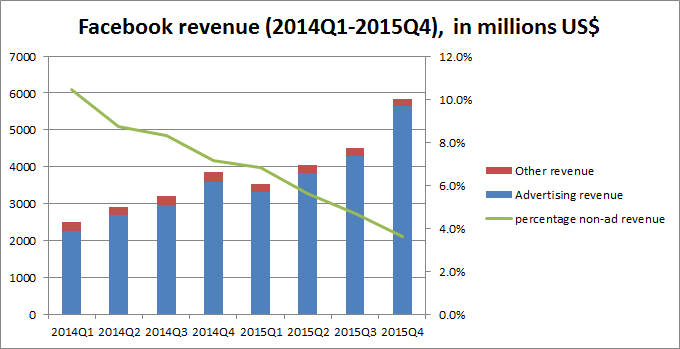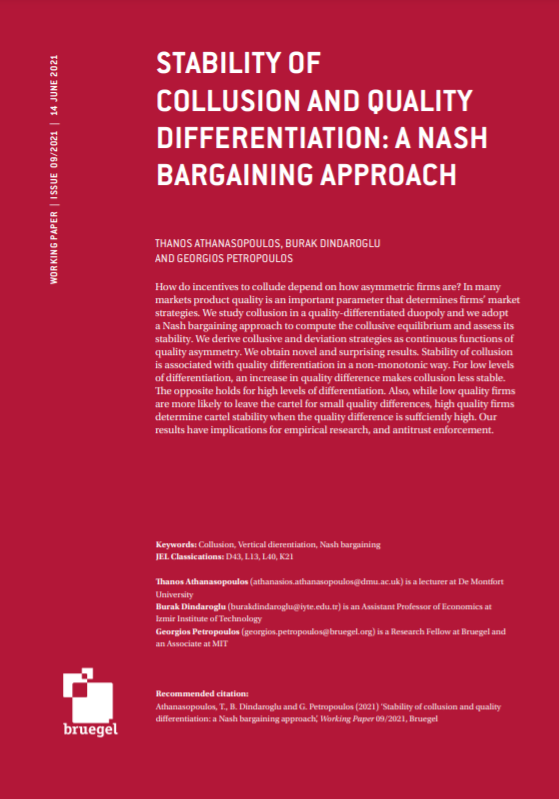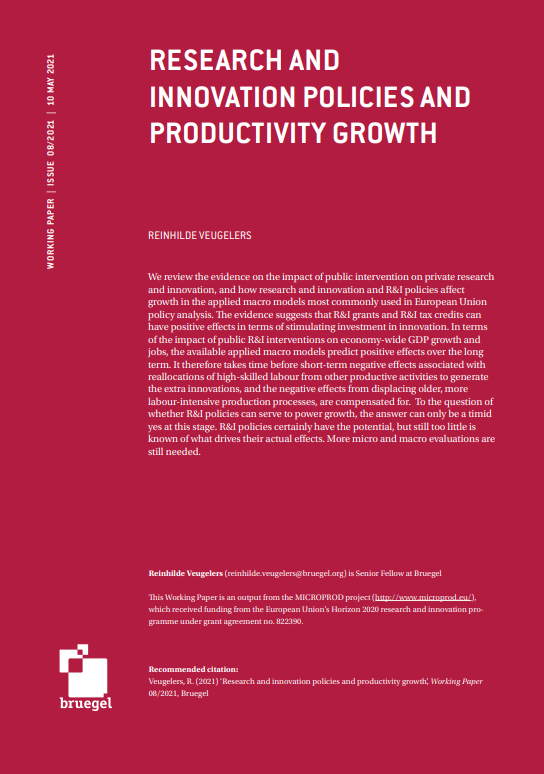Blog Post
German Facebook probe links data protection and competition policy
On March 2, 2016, the German Federal Cartel Office opened an antitrust investigation into Facebook’s contract clauses on data use, in what appears to be the first antitrust case in Europe based on a breach of data protection rules. We discuss the link between data protection rules and competition policy, which is still underexplored.
The German Federal Cartel Office is investigating Facebook for abusing its possibly dominant position in the social network market by infringing data protection rules.
The initial suspicion is that Facebook has abused its possibly dominant position through its specific terms of service on the use of user data. However from the German authorities’ announcement, the connection between the suspected infringement of data protection rules and Facebook’s market power is unclear.
Users must agree to Facebook’s terms of service on data collection, but understanding and assessing the scope of this agreement is not straightforward. The use of unlawful terms and conditions could represent an abusive imposition of unfair conditions on users.
The German Federal Cartel Office will investigate to what extent there exists a connection between the possibly dominant position of the company and the use of these terms and conditions, and whether consumers are sufficiently informed about the type and extent of data collection, as well as other issues. If the authorities find a connection between the infringement and the dominant position, it could be abusive practice under competition law implying a fining policy and other corrective measures imposed on the violator.
User data are highly important for advertising-financed internet firms such as Facebook. Facebook collects large amounts of personal user data, allowing its advertising customers to better target their activities. Facebook’s advertising revenues went up from 90% of total revenues in the first quarter of 2014 to 96% in the last quarter of 2015, as shown in the figure below.
Source: Facebook Quarterly Earnings Reports, available at http://investor.fb.com/results.cfm.

A European case, beyond Germany?
German national data protection law is among the strictest in the world. In this preliminary phase of the investigation, it is still unclear whether Facebook’s use of user data breaches data protection rules in Germany, and whether it could also breach rules in other countries.
If German case-law allows a suspected violation of the law made by a dominant firm in a non-market competition matter to be pursued under abuse of dominance, a good question is whether such an approach could be extended at the EU level.
In response to the investigation, Competition Commissioner Margarethe Vestager indicated that Germany is well placed to carry out this investigation, and as they do it from both a German and European perspective it will benefit consumers all over Europe. Moreover, she stated that “it shouldn’t only be the commission doing things that are new in terms of developing competition law”.
Commissioner Margarethe Vestager said that it shouldn’t only be the commission doing things that are new in terms of developing competition law.
In January, Vestager indicated that the European Commission is looking closely at whether the use of big data by large internet companies violates competition rules. Although no competition problems have yet been found in this area at EU level, it does not mean they will not be found in the future.
It is worth noting that data and privacy considerations have not had decisive effects in previous cases at the European Commission. In the Facebook/Whatsapp merger, for example, the Commission defined the relevant markets as the markets for consumer communication services, social networking services and online advertising services.
This assessment was based on the market investigation, in which it sends questionnaires to all kinds of players in the industry. The Commission indicated that “any privacy-related concerns flowing from the increased concentration of data within the control of Facebook as a result of the transaction do not fall within the scope of the EU competition law rules but within the scope of the EU data protection rules.” (par. 164). Interestingly, the market investigation in this merger also showed that privacy and security concerns are becoming increasingly important to consumers (par. 87).
Challenges in the Facebook investigation
Previous research has seen limited antitrust concerns in social network markets. Justus Haucap and Ulrich Heimeshoff investigated whether the internet is driving competition or market monopolisation, and carried out case studies for Google and Facebook, among others. They say that having profiles on multiple social media platforms, known as ‘switching’ and ‘multi-homing’, is not too costly, which gives scope for further competition.
In an earlier paper, Catherine Tucker and Alex Marthews indicate that there is little room for antitrust issues in social network markets.Users almost always use social networking sites for free, and so it is difficult to prove anticompetitive harm.
Moreover, in the advertising market, where Facebook has attempted to monetise its user base, antitrust issues are limited due to competition from other advertising channels and the inherent fragility of social networks.
A dominant position in itself is not illegal, but a dominant company has a special responsibility to ensure its conduct does not distort competition. The analysis of abuse of dominance cases consists of two parts: assessing whether the firm in question has a dominant position in the relevant market and examining whether the firm abuses this dominant position.
Abuse of dominance can take many forms, such as foreclosing downstream competitors, raising barriers to entry and imposing unfair prices, to name a few.
According to the EC 2009 Guidance paper “The commission considers that an undertaking which is capable of profitably increasing prices above the competitive level for a significant period of time does not face sufficiently effective competitive constraints and can thus generally be regarded as dominant”.
The opening of the investigation clearly suggests that the German Federal Cartel Office views data privacy rules as market conditions that should be taken into account for consumer welfare analysis.
However, the Commission also indicates openness towards other parameters of competition, such as the quality of services, which in this case could be attributed to how consumers value data protection. The opening of the investigation clearly suggests that the German Federal Cartel Office views data privacy rules as market conditions that should be taken into account for consumer welfare analysis.
The exact nature of Facebook’s conduct and the connection between the conduct and possible dominant position is still unclear. The initiation of the investigation could relate to Article 102 (a): “directly or indirectly imposing unfair selling prices or other unfair conditions”. This is an exploitative abuse that harms consumers directly.
Although consumers generally do not pay for the use of social networks,providing personal information could be considered as the price paid. This means that consumers also pay a “price” when switching platforms. As Newman indicates in a recent paper, “antitrust law protects the right to the fruits of a competitive marketplace: in zero-price markets, the right to receive the best possible products in exchange for the least possible amount of information. Abandoning oversight of zero-price markets to privacy law simply because information (instead of money) is the relevant currency would be a grave error.”
Nevertheless, determining unfair prices or conditions is a tall order. Moreover, it is difficult to determine what the “fair” price or level of privacy would have been without abuse and it could be that smaller players, who do not have a dominant position to abuse, offer even lower levels of privacy.
As a dominant company, Facebook would have a special obligation to use adequate terms of service, which are not always mandatory for smaller players (at least from the competition policy point of view, but, they could still breach the data protection rules in place).
As the announcement of the German case is unclear on this point, it is important the authorities clarify whether dominant firms should be required to adopt higher data protection and transparency standards than smaller firms, and why.
Linking data protection and competition policy
In order to maximize gains, consumers need to feel safe when using online platforms and providing data, as I explained in a blog post.
Consumers’ privacy needs to be adequately protected by legislation, and transparency is needed as to how the data is processed. As the German Federal Cartel Office indicated, a concern in the present case may be that consumers do not understand and are not able to assess the scope of the agreements they accept.
In the merger between Google and advertising company DoubleClick, switching costs (including those related to data), were found to be manageable (p. 167). These switching costs are determined on a case-by-case basis, but if switching from one platform to another is too costly, data portability could be a solution in abuse cases.
If consumers are able to move their data from one platform to another (still receiving a “tailored” product, without new platforms having to collect data from scratch), switching costs for consumers would be substantially lower, which in turn would a social network’s incentives to abuse its market power.
In the United States, former Federal Trade Commissioner Pamela Jones Harbour submitted a dissenting statement for the Google/DoubleClick merger, expressing concerns that both competition and privacy interests of consumers were not adequately addressed. She also highlighted how, as the only federal agency with both consumer protection and competition jurisdiction, it should have been a call to action for the Federal Trade Commission.
Authorities must take into account the dynamic nature of digital markets. In order to protect consumer welfare, authorities must adopt a more forward-looking view, considering how competition will evolve in the future through potential entry or exit of firms, or shifts in the market conduct. Data is the currency of these new markets. Links between data flows and market competition should be further explored and analysed with this dynamic perspective in mind.
Handling these types of cases requires thorough knowledge of both competition law and data protection rules.
The case in Germany is being conducted in close contact with data protection officers. Handling these types of cases requires thorough knowledge of both competition law and data protection rules. This places an extra burden on authorities’ scarce resources and cooperation between competition and data protection authorities is key.
Republishing and referencing
Bruegel considers itself a public good and takes no institutional standpoint. Anyone is free to republish and/or quote this post without prior consent. Please provide a full reference, clearly stating Bruegel and the relevant author as the source, and include a prominent hyperlink to the original post.










